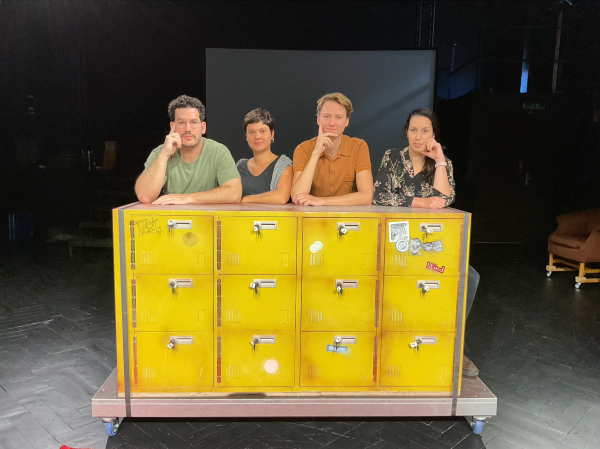Art and Activism at ITZ
On the 5th of November the "Hotel of Change" will open its doors at the ITZ! In this production professional performers of the Hungarian performance collective STERO AKT will share the stage with activists from Tübingen! ITZ-dramaturg Jana Gmelin had a few questions to director Martin Boross and dramaturg Gabor Thury.
 The performers of STEREO AKT: László Göndör, Luca Borsos, Máté Martinkovics, Emina MessaoudiSTEREO AKT - who are you, what do you do, how do you work?
The performers of STEREO AKT: László Göndör, Luca Borsos, Máté Martinkovics, Emina MessaoudiSTEREO AKT - who are you, what do you do, how do you work?Martin: We founded STEREO AKT in 2013, so this is our 10th season now. Despite the challenges of making independent, contemporary, postdramatic theatre - which is a vicious combination - we were able to grow to one of the most established collectives of Hungary. We experiment with different forms and aesthetics on a wide range from site-specific to black-box theatre, from flashmobs to feature films. What’s more or less the same always: we try to invent something that corresponds to the reality of the viewer. Therefore our works are often political with a community focus, and lately we are shifting toward documentary and “Bürgerbühne” style. Our plots and text of every piece is created through the collective work of the full creative team. Hotel of Change is going to be our second co-production with ITZ.
How did you come up with the idea for the production „Hotel of Change“? What motivates you?
Gábor: We always work with experts in the research phases of our productions, and in some of the productions they even become the protagonists of our performances. These encounters can be very enriching and inspiring as they open up new perspective for us as well as for the audience. The creations of STEREO AKT always address topics with political and social relevance. In this case we were interested in those who are actually the “engines” for changes around us, who are giving the impulses towards a more sensitive and inclusive society. This interest might come from the fact that we live in Hungary, and it is an omnipresent question for us how a system could be changed and how the hope can be kept. We wanted to bring performers and activists together on the stage not only to get to know their causes and personal stories but also to facilitate encounters between theater and activism. Our hypothesis was that these two fields have a lot in common and we share some dilemmas and situations of our realities, such as being passionate about our causes, make sacrifices in order to succeed, being subjected to the dangers of burnout, etc.
How did you work with the local activists?
Martin: It’s a challenging task to grow roots in a city as a guest in such a short time. However we need to try. We put out an open call, and first we contacted potential participants via an online video workshop back in the spring. Later in September we organized an in-person workshop, and reached out to dozens of organizations, initiatives. We talked to a large number of people from various fields: environment, feminism, anti-racism, LGBTQ+, anti-militarization, housing, human rights and more. We slowly discovered the communities behind the causes and saw how interconnected everything is - on a personal basis and ideologically, too. As one of our activist participants said: “you can’t only change one thing. It has to be a domino-effect”. On the workshops and later during the rehearsals we collected Personal stories and experiences of the activists through drama games, improvizations, interviews, field visits etc., while we took a closer look on causes that are worth fighting for, on causes that may not be worth the fight, and most importantly on the people behind these fights.
How are art and activism connected?
Gábor: Art and activism has a very long shared history, and they are connected in a number of different ways. What is particularly interesting for us in the context of Hotel of Change, is that striving for change is something both art and activism share. Every activist wants to shape the world they live in, and so do artists to some extent. Both art and activism are able to trigger thoughts, emotions, empathy, ask urgent questions and challenge the status quo.
Martin:Also, artists and activists are similar in the sense that their job / mission is reflected in their lifestyles. Lots of sacrifices, and they are exposed to the danger of self-exploitation, financial instability, burn-out. But at the same time both “species” work for a higher goal and tell stories over and over again. Stories that they feel are the most important.
You are in Tübingen for the second time! How do you feel about the city?
Gábor: We already loved Tübingen and felt connected to it, but it turns out that the best way to learn a city is to meet its most inspiring people.. We experienced Tübingen from a very different perspective while we got to know people, places and causes we otherwise would probably never heard of, we feel very lucky to have this opportunity in Tübingen.


